Ruta de navegación
Menú de navegación
Blogs
Entries with Categories Global Affairs Book reviews .
[Bruno Maçães, The Dawn of Eurasia. On the Trail of the New World Order. Allen Lane. Milton Keynes, 2018. 281 pp]
review / Emili J. Blasco
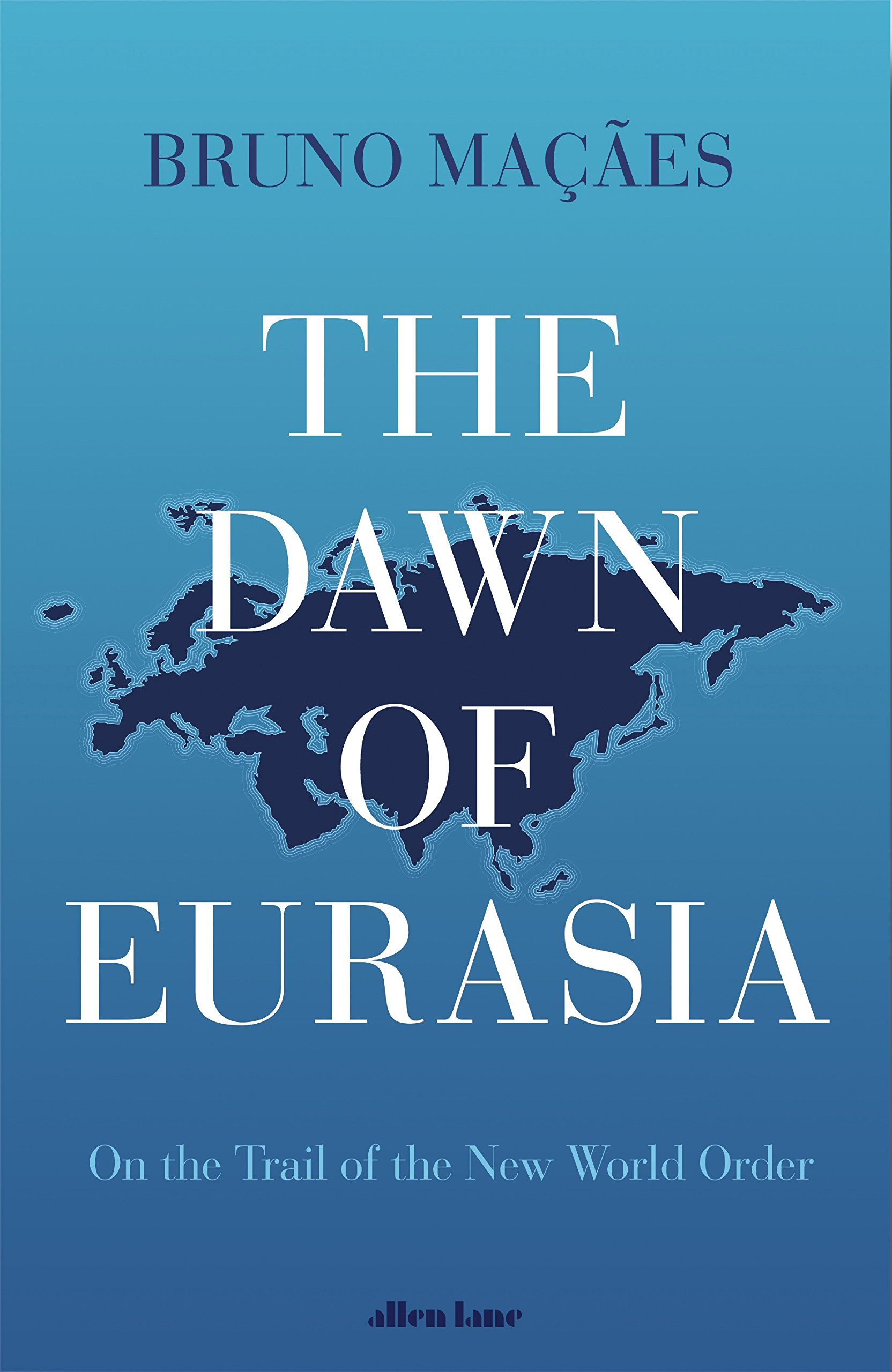 |
The discussion on the emergence of Eurasia as an increasingly compact reality, no longer as a mere geographical description that was conceptually a chimera, owes much to the contribution of Bruno Maçães; particularly to his book The Dawn of Eurasia, but also to his continuous proselytizing to different audiences. This Portuguese diplomat with research activity in Europe notes the consolidation of the Eurasian mass as a single continent (or supercontinent) to all intents and purposes.
"One of the reasons we have to start thinking about Eurasia is because this is how China is increasingly looking at the world (...) China is already living a Eurasian age," says Maçães. What is new about it, he says, "is not that there are such connections between continents, but that, for the first time, they work both ways. Only when the influence flows in both directions can we speak of an integrated space." The Silk Belt and Road Initiative, especially its overland route, sample that China is no longer looking only to the Pacific, but is also contemplating new routes to Europe.
Maçães urges Europe to adopt a Eurasian perspective, for three reasons: because Russia and China have one; because most of the big foreign policy issues of our time have to do with how Europe and Asia are connected (Ukraine, refugee crisis, energy and trade); and because all the security threats of the coming decades will play out in a Eurasian context. Maçães adds a final reason why Europe should become more actively involved in the Eurasian integration project : it is the way to combat the forces of disintegration that exist within Europe itself.
From the various considerations included in the book, some suggestive ideas could be highlighted. One is that Russia's historic problems of identity, straddling Europe and Asia - seeing itself as different from the Europeans and at the same time being attracted by the modernity of the West - are now being replicated in the East, where China is on its way to creating a second pole of economic growth and integration in the supercontinent. If Europe is one of the poles and Asia (China and the other successful countries of the Far East) the other, then what is Russia, if it does not fully respond to the European and Asian identities?
The Silk Belt and Road Initiative gives geopolitical importance to Central Asia, as Maçães reviews. Thus, China needs a clear dominance of Xinjiang, its westernmost province and the gateway to the Central Asian republics. The land route to Europe cannot exist without the Xinjinag segment, but at the same time the exhibition of this Uyghur-majority territory to trade and modernization could accentuate its separatist aspirations. Just northwest of Xinjiang is the ex-Soviet republic of Kazakhstan, a vast country of great agricultural value, where Chinese attempts to buy land are being viewed with high suspicion from its capital, Astana. Maçães estimates that if Russia were to try to reintegrate Kazakhstan into its sphere of influence, as vehemently as it has done with Ukraine, "China would not stand aside."
Not only are the East Coast (European peninsula) and the West Coast (Pacific coast) moving closer together, but the connections between the two also improve logistical conditions in the interior of the supercontinent. This is precisely one of the objectives of the Silk Belt and Road Initiative: as Chinese companies have moved away from coastal business hubs to lower labor costs, they are moving farther away from ports and therefore need better land connections, thus contributing to the shrinking of Eurasia.
[Josep Piqué. The world that is coming to us. Challenges, Challenges and Expectations of the 21st Century: A Post-Western World with Western Values? Deusto. Barcelona, 2018. 254 pp.]
review / Ignacio Yárnoz
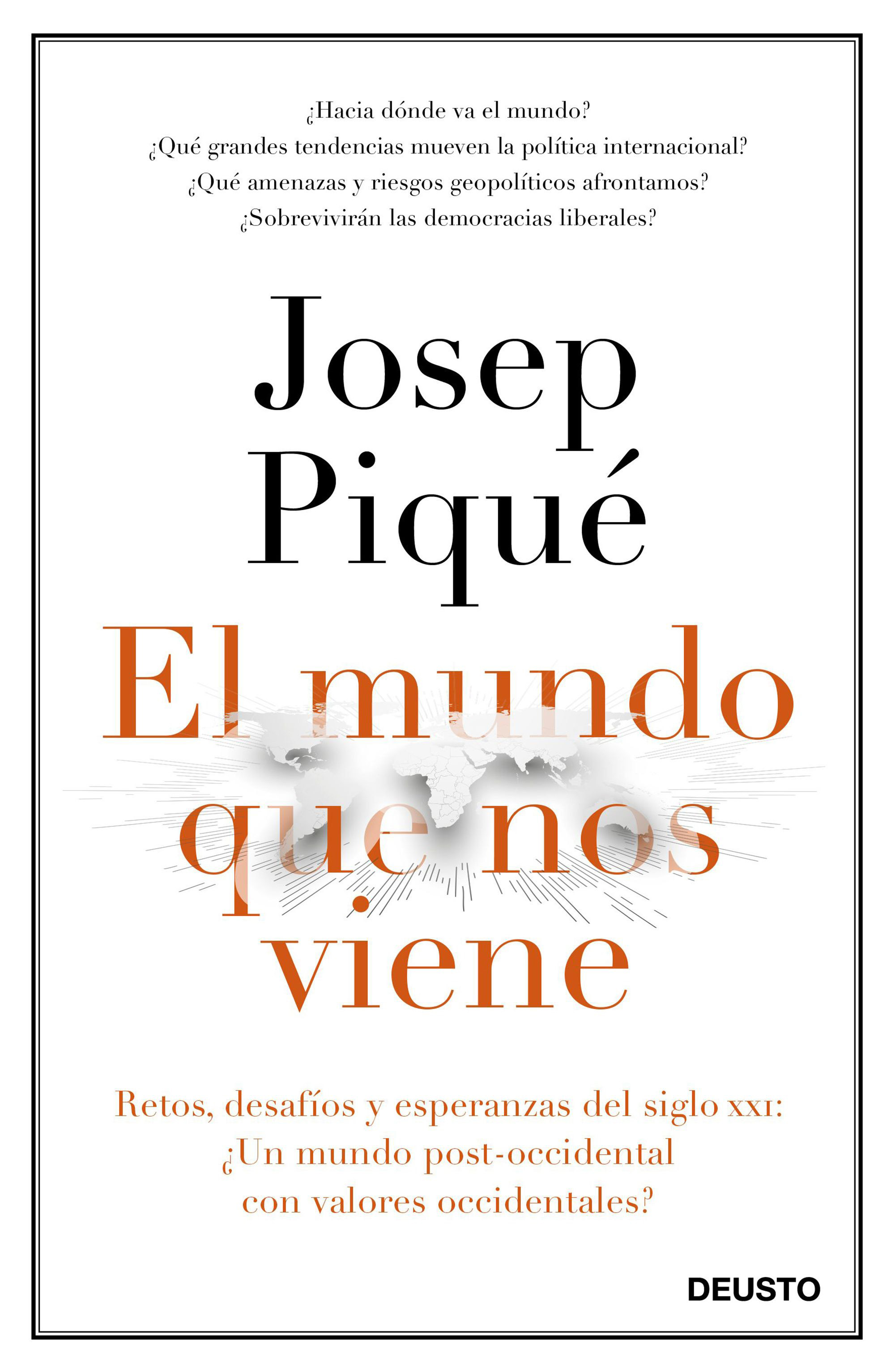 |
Europe may lose relative economic weight or, worse, demographic weight and competitiveness, putting the sustainability of its welfare state at risk. It may become less and less relevant on the global geopolitical stage and move away from the planet's new center of gravity. However, it remains an indisputable pole of attraction for the rest of humanity due to its peace, democracy, freedom, gender equality and opportunities, tolerance and respect. This is what the author Josep Piqué wants to convey to us in The World That Comes to Us. We are talking about an economist, businessman and political leader – head of several ministries, including Foreign Affairs, during the government of José María Aznar – who has experienced first-hand the transition from a Eurocentric world to one that looks more to a thriving Asia.
The work turns out to be a good geopolitical analysis of the world, in which a fragmented European Union, a very thriving China, a Russia nostalgic for its imperial past, a Middle East divided in wars between irreconcilable factions and an Anglo-Saxon world withdrawn into itself stand out. I divide it into different chapters depending on the area geographically, the book takes an in-depth look at each and every topic.
First of all, the author emphasizes the status that the Anglo-Saxon world is experiencing, especially the United States and the United Kingdom, countries that have renounced their world hegemony for the sake of a retreat into themselves. In the case of the United Kingdom, we talk about the divorce from the European Union, and in the case of the United States, we talk about President Donald Trump's policies, such as the withdrawal of the TPP (Trans Pacific Partnership) with Japan, Chile, Canada, Australia, Brunei, New Zealand, Mexico, Peru, Malaysia, Vietnam and Singapore. Paradoxically, in the face of the attitude of these two actors, there is the rise as a power of a China that no longer dissembles in its actions, that no longer wants to be that silent power that Deng Xiaoping formulated.
Russia and its actions abroad are also subject to analysis from different perspectives, but mainly in light of Russia's obsession with its security. As the author argues, it is a state that is very sensitive to its borders and tries to keep the enemy poles as far apart as possible, which implies a policy of influence in the states bordering its border. This explains their reactions to the change of sides of the Eastern European countries and their gradual incorporation into the European Union or NATO. Nor can we forget the topic of gas, the implications of the melting of the Arctic, the oil deposits in the Caspian Sea or other issues that the author reviews.
If we look at the picture in the Middle East, the status It does not seem to be reaching a lasting peace. Neither in the panorama of the Palestinian-Israeli conflict, nor in the different proxy wars between Iran and Saudi Arabia, not to mention the failure of the different Arab Springs. This status It leads the author to analyze in historical perspective how all this has happened. On the other hand, it analyzes the complexity of the different intersecting interests between Turkey, Syria, Russia, Saudi Arabia and Iran that complete the chessboard represented by the Middle East.
Finally, we must not forget the chapter that Josep Piqué reservation for your thesis at the beginning of this article. article: the future of the European Union. As he himself points out, Europe represents the neo-Western synthesis in a post-Western world. However, you need to realize this potential and benefit from it. As Piqué argues, the attractiveness of the European Union as much as project inclusive as well as the liberal and democratic values it represents must be a card that the EU must play more in its favour. However, it also faces challenges such as the rise of nationalism and anti-Europeanism, Russian interference in internal affairs and the lack of credibility of the European institutions. All of this in the framework of the severe economic recession of 2007, which the author also analyzes as a good economist of degree program. Finally, we must not forget some final notes dedicated to the implications of new technologies, Latin America and the opportunities that Spain has.
All of this together represents a complete journey through the world of geostrategy – in the review of the regions of the planet, only one is missing. accredited specialization to Africa – which details all the keys that a person with an interest in international relations should take into account when analysing current affairs.
[Roberto Valencia, Letter from Zacatraz. Libros del K.O. Madrid, 2018. 384 pp.]
review / Jimena Villacorta
 |
The story of El Directo – a young Salvadoran man who at the age of 17 was blamed for 17 murders, who was in and out of prison and was eventually sentenced by his fellow gang members – serves as a canvas for an even bigger picture: the serious social problem posed by violent gangs in Central America, particularly in El Salvador.
Roberto Valencia, a Spanish journalist who has lived in that Central American country for almost twenty years, has dedicated time and effort to addressing this problem in depth as a reporter for "El Faro". portal Salvadoran news outlet awarded for his research. Letter from Zacatraz (as the local media call the maximum security prison of Zacateoluca) is a journalistic story that through a concrete story exposes the broader panorama of a truly complex reality.
September 11, 2012 was the first time Valencia sat down to talk with Gustavo Adolfo Parada Morales, alias El Directo, someone who for years had garnered media attention, despite the existence of thousands of other young people involved in gangs. That contact staff encouraged the journalist to seek out other testimonies, including fill in a book that collects Parada's direct voice and that of people who knew him, based on interviews with those who loved him, such as his mother or his wife, and with those who confronted him, such as some judges.
As a result of an unwanted pregnancy, El Directo was born on January 25, 1982 in the city of San Miguel. Barely two decades later, he was already the most dangerous and feared man in El Salvador, or at least that's how the media projected him. A member of the Pana di Locos, a clique of the Mara Salvatrucha, he became the main public enemy. From the age of 17, accused of as many murders (of which he only admitted six) and various crimes, El Directo was in three juvenile detention centers and nine prisons. He had the opportunity to start a new life in Costa Rica, but it was ruined. He didn't make it to the United States. He was free for several months, but it wasn't long before the police recaptured him.
Through Parada's life, the author projects the phenomenon of the maras in El Salvador. It emphasizes how this phenomenon mainly affects the lower classes, while the rest of society does not realize the full magnitude of the problem and, therefore, is not interested in finding a solution. How is it possible, Valencia asks, that a society like El Salvador's, with 6.5 million inhabitants, tolerates an average of 10 homicides a day, not to mention the numerous other crimes, in a country where 1% of the population are gang members.
The repressive measures applied by the governments of the right (ARENA) and the left (FMLN) have not improved the gang problem. They have been growing, both inside and outside detention centres, many of which are in a deplorable state. It is precisely the condition of the prisons that aggravates the status: The infrastructure is damaged, there is a great deal of unsanitary conditions and overcrowding is extreme. In most prisons, gang leaders have a large share of control and dominate their respective organizations. "El Salvador's prison system is the most overcrowded in the hemisphere, according to the Organization of American States," Valencia said.
El Directo went through several prisons, where he was seriously wounded on multiple occasions, sometimes by order of the Mara Salvatrucha, which declared him a traitor and threatened to kill him, and other times by police and prison employees. After a few months in prison, he decided to reform himself and give up his activity in the MS. This brought him several opportunities, but he returned to prison. He was finally murdered in 2013, at the age of 31, by members of his new gang, La Mirada Locos, because he had been accused of ordering the killing of someone from the organization with whose wife he had had an affair.
It is interesting to note how in a country where a large number of crimes are recorded, for at least ten years the case of El Directo had an absolute priority in the media, which often exaggerated Parada's criminal record. "We live in a country where great murderers have been granted amnesty. The drugs circulate relatively freely and, despite the fact that police officials have said that there are important names in the business, of the state apparatus and the army involved in drug trafficking, we have not seen any arrests at that level," he told Valencia President of the Central American University, José María Tojeira. And he adds: "Income tax evasion is a fairly widespread vice among the wealthiest sectors. The police are still dealing with a Degree of significant corruption. Deputies are pardoned or investigated for acts in which the life or honor of other citizens has been severely threatened." For his part, Fernando Sáenz Lacalle, archbishop emeritus of San Salvador, regrets that journalists, commentators, analysts and politicians repeated over and over again, "like a church choir, the false refrain of the 17 years, 17 murders." In his opinion, "perhaps they went too far in terms of display and arrogance," according to Valencia.
Roberto Valencia concludes that the problem with the media is that at first they were benevolent towards the gangs, and then magnified the phenomenon, not to mention the repressive measures and the policies used to combat them.
Letter from Zacatraz is not a condescending book, but the criticism does not drown all hope. He warns that Salvadorans have become accustomed to living with this problem. Nowadays it is more common to avoid certain places that are known to be dangerous, than to try to fight for the betterment of the country. But it fosters confidence that shattered lives like El Directo's will serve to make new generations want something better for themselves.
[Robert Kagan, The Jungle Grows Back. America and Our Imperiled World. Alfred A. Knoff. New York, 2018. 179 p.]
review / Emili J. Blasco
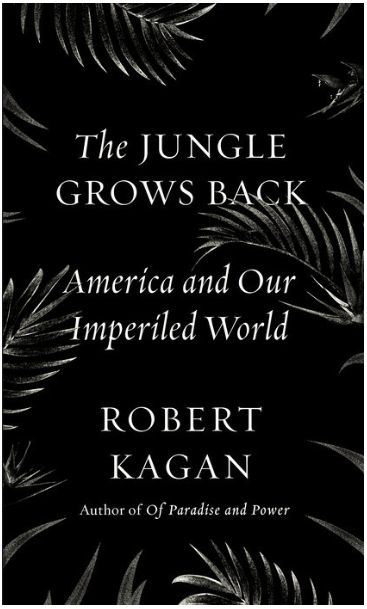 |
At this point in the century, it is already clear that the consecration of the liberal system in the world, after the breakup of the communist bloc at the end of the Cold War, is not something that will happen inexorably, as was thought. It's not even likely. The divergent models of China and Russia are gaining traction. Democracy is in retreat, even in Western societies themselves.
It is the jungle that grows again where a garden had been extended. This is the image that Robert Kagan uses in his new book to warn about the desirability of the United States not shirking its responsibility to lead the effort to preserve the liberal world order. For Kagan, the liberal system "was never a natural phenomenon," but a "great historical aberration." "It has been an anomaly in the history of human existence. The liberal world order is fragile and not permanent. Like a garden, it is always besieged by the natural forces of history, the jungle, whose vines and weeds constantly threaten to cover it," he says. It is an "artificial creation subject to the forces of geopolitical inertia," so that the question "is not what will bring down the liberal order, but what can sustain it."
Kagan is outlived in the media by the label He is a neoconservative, although his positions are in the central current of American Republicanism (majority for decades, until the rise of Donald Trump; in fact, in the 2016 campaign Kagan supported Hillary Clinton) and his work is developed at the rather Democratic Brookings Institution. He does defend clear U.S. leadership in the world, but not out of self-assertion, but as the only way for the liberal international order to be preserved. It is not that, by sponsoring it, the United States has acted disinterestedly, because as one of its builders, Secretary of State Dean Acheson, said, in order to protect the "American experiment in life" it was necessary to create "an environment of freedom" in the world. But the other Western countries, and others where the regime of freedoms of democratic societies has also been extended, have also benefited.
The thesis Kagan's central point is that, although there was America's own interest in creating the international architecture that ordered the world after World War II, it benefited many other countries and guaranteed the victory of free societies over communism. Crucial to this, according to Kagan, is that while Washington at times acted against the values it preached, it generally played by certain rules.
Thus, the U.S. "did not exploit the system it dominated to gain lasting economic advantages at the expense of the other powers of order. Put simply: he could not use his military dominance to win the economic competition against other members of the order, nor could he treat the competition as zero-sum and insist on always winning. It's true that the U.S. benefited from being the main player both economically and militarily, "but an element of core topic to hold the international order together was the perception of the other powers that they had reasonable opportunities to succeed economically and even sometimes surpass the United States, as Japan, Germany, and other nations did at various times."
Kagan admits that Washington's willingness to engage in large doses of fairplay on the economic plane "did not extend to all areas, particularly not to strategic issues." In these, "order was not always based on rules, because when the United States deemed it necessary, rightly or wrongly, it violated the rules, including those it claimed to defend, either by carrying out military interventions without UN authorization, as it did on numerous occasions during the Cold War, or by engaging in covert activities that had no international backing."
It has been an order that, in order to function, "had to enjoy a certain Degree of voluntary acceptance by its members, not to be a competition of all against all, but a community of like-minded nations acting together to preserve a system from which all could benefit." "Order was kept in place because the other members viewed U.S. hegemony as relatively benign and superior to other alternatives." test This is why the countries of Western Europe trusted Washington despite its overwhelming military superiority. "In the end, even if it didn't always do so for idealistic reasons, the United States would end up creating a world unusually conducive to the spread of democracy."
Kagan disagrees with the view that after the dissolution of the USSR, the planet entered a "new world order." In his view, what was called the "unipolar moment" did not actually change the assumptions of the order established at the end of World War II. That is why it made no sense that, with the fall of the Berlin Wall, the world was thought to be entering a new era of unstoppable peace and prosperity, and that this made America's role as a gardener unnecessary. The withdrawal from the world carried out by Trump and initiated by Obama (Kagan already in 2012 published The World America Made, in defense of American involvement in the world), would be allowing the return of the chaotic vegetation of the jungle.
The Jungle Grows Back is in the format of a small book, typical of a essay It is a restrained film that aspires to convey some fundamental ideas without wanting to overwhelm the reader. Despite pointing out the dangers of the liberal order, and noting that the United States is in retreat, the book offers an optimistic message: "This is a pessimistic view of human existence, but it is not a fatalistic view. Nothing is determined, neither the triumph of liberalism nor its defeat."
[Pedro Baños, The World Domain. Elements of power and geopolitical keys. Ariel. Barcelona, 2018. 366 p.]
review / Manuel Lamela
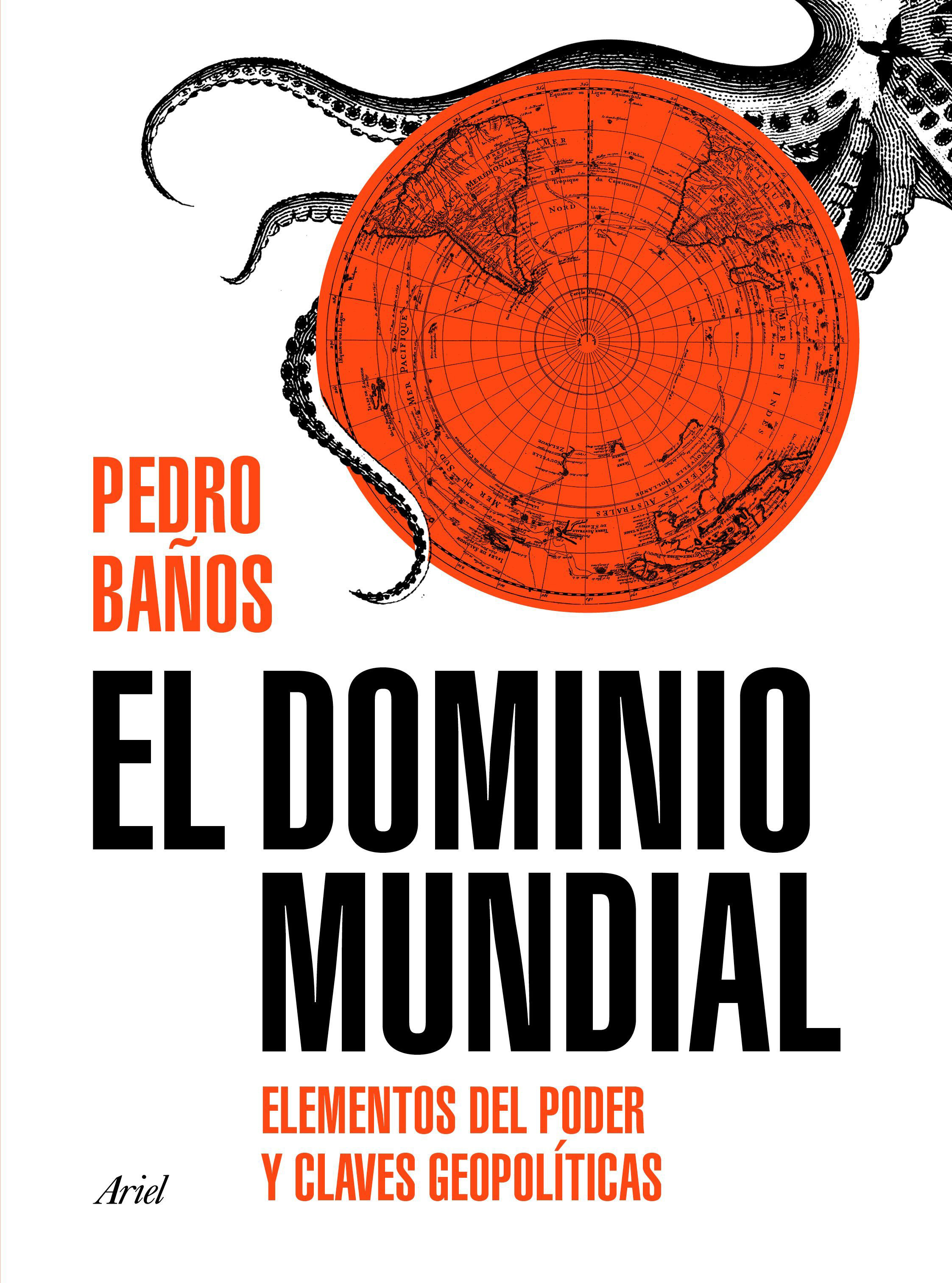 |
If your previous submission, The Keys to World Domination, served as a guide to introduce us to the vast world of geopolitics and international relations, in his new work, Colonel Pedro Baños Bajo, unveils us and gives us a glimpse of the sample the key elements and instruments for world domination and how these are used by the various actors in their constant struggle for power on a global scale. We are on the verge of a paradigm shift on the international scene, and this process, as the author explains, will be led by demography and technology.
In his business In order to democratize geopolitics, Pedro Baños uses clear and precise language to facilitate the understanding of the work. There will be numerous illustrations present in the book that will be accompanied by brief explanations to get a broader vision of the topic to be treated.
The Elements of World Power is the name given to the first half of the book, it is divided into nine different parts that according to the author are key when it comes to understanding the global power game. In this first half, issues of rigorous relevance and tremendously important on the international scene will be discussed. From the hybrid threat, which represents a new way of waging war, to the role of intelligence services today, to the transcendental importance of natural resources and demographics. It is certainly a fairly comprehensive analysis for those looking for a brief explanation of the greatest challenges that threaten to destabilize our current social order. It is true that some of the explanations can be defined as simple, but this does not have to be understood as a pejorative characteristic. The author's ability to synthesize extremely complex issues can encourage the reader's curiosity and make the leap to other great works where they can delve into more specific topics.
In the second part of the book we find a more concrete analysis in which the author focuses on only two factors: technology and demographics. The population imbalance, the large migratory flows and what some call the fourth industrial revolution are some of the issues that Colonel Baños highlights in his analysis. In the author's opinion, the transformations to which these two elements will be exposed will mark the course of humanity in the coming years. In this more incisive study, the author sample how vulnerable human society is to the future changes that are to come and how this alleged weakness will make conflicts difficult to avoid in the near future. Pedro Baños argues that despite the belief we have of living in a perfectly organized and structured society, the reality is far from the latter, since it is a small group The human being charged with directing and leading the destiny of all humanity as a whole.
Despite distilling a certain pessimism throughout the work, Pedro Baños decides to conclude his analysis with a message of hope, advocating for a united humanity. manager and in solidarity with their environment.
[Justin Vaïsse, Zbigniew Brzezinski. America's Grand Strategist. Harvard University Press. Cambridge, 2018. 505 p.]
review / Emili J. Blasco
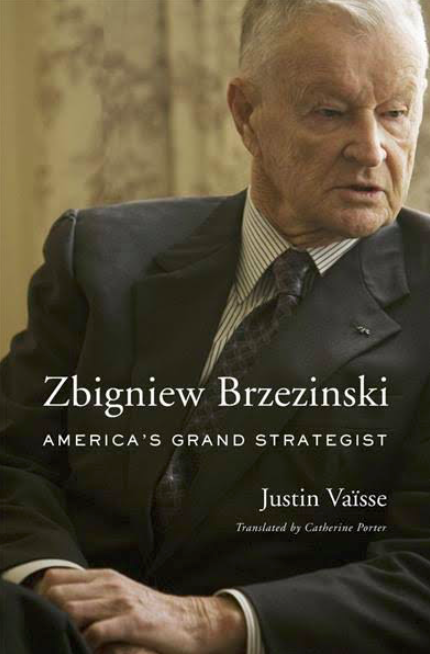 |
Zbignew Brzezinski, National Security Advisor under Jimmy Carter, is one of the great names in American foreign policy in recent decades. In some respects comparable to Henry Kissinger, who also went directly from the University – where both were colleagues – to the Administration, the latter's greater renown has sometimes obscured the degree program by Brzezinski. Justin Vaïsse's biography, written with access to documentation staff by Brzezinski and first published in French two years ago, highlights the singular figure and thought of someone who had a continuous presence in the discussion about U.S. action in the world until his death in 2017.
Born in Warsaw in 1928 and the son of a diplomat, Brzezinski moved with his family to Canada during World War II. From there he went to Harvard and immediately rose to prominence in the academic community of the United States, where he became a naturalized citizen and lived the rest of his life. If in the 1940s and 1950s, the leading positions in the Administration were nurtured by an older generation that had led the country into war and established the new world order, in the following decades a new world order emerged. group of statesmen, in many cases coming out of the main American universities, who at that time had acquired an unprecedented preeminence in the gestation of political thought.
This was the case of Kissinger, who was born in Germany and also emigrated during the war, who was first National Security Advisor and then Secretary of State under Richard Nixon, and also under Gerald Ford. The next president, Jimmy Carter, brought Brzezinski, who had advised him on international issues during the election campaign, to the White House. The two professors maintained a respectful and at times cordial relationship, although their positions, ascribed to different political camps, often diverged.
For biographical reasons, Brzezenski's original focus—or Zbig, as his collaborators called him—to overcome the difficulty of pronouncing his surname– was in the Soviet Union and Eastern Europe. From relatively early on he came to the conclusion that the USSR would be incapable of maintaining the economic pulse with the West, so he advocated "peaceful engagement" with the Eastern bloc as a way to accelerate its decomposition. That was the doctrine of the Johnson, Nixon, and Ford administrations.
However, since the mid-1970s, the USSR faced its evident decline with a flight forward to try to re-establish its international power, both in terms of strategic weapons and in its presence in the Third World. Brzezinski then moved to a tougher stance on Moscow, earning him frequent clashes with other figures in the Carter administration, especially Secretary of State Cyrus Vance. Carter had arrived at the White House in January 1977 with some speech appeasement, while remaining belligerent in terms of human rights. The Soviet invasion of Afghanistan in 1979 reinforced the thesis by Brzezinski.
Carter's short presidency left little room for the committee Homeland Security will score special wins. The greatest, although joint work of the presidential team, was the signature of the Camp David accords between Israel and Egypt. But the fiasco of the attempted rescue of the hostages at the Tehran Embassy, which was not Brzezinski's direct responsibility, weighed down an administration that cannot have a second term.
Situated on the right of the Democratic Party, Brzezinski is described by Vaïsse as a "fellow traveler" of the neoconservatives (the Democrats who went over to the Republican side demanding a more robust defense of U.S. interests in the world), but without being a neoconservative himself (in fact, he did not break with the Democratic Party). In any case, he always stressed his independence and was difficult to pigeonhole. "He was neither a warmonger nor a pacifist. It was hawk and dove at different times," says Vaïsse. For example, he opposed the first Gulf War, preferring extreme sanctions, but was in favor of intervening in the Balkan War.
After leaving the Administration, Brzezinski joined the Center for Strategic and International Studies (CSIS) in Washington and maintained an active production of essays.
[Jorge Orlando Melo, Historia mínima de Colombia. El high school de México-Turner. Bogotá, 2018. 330 p.]
review / María Gabriela Fajardo
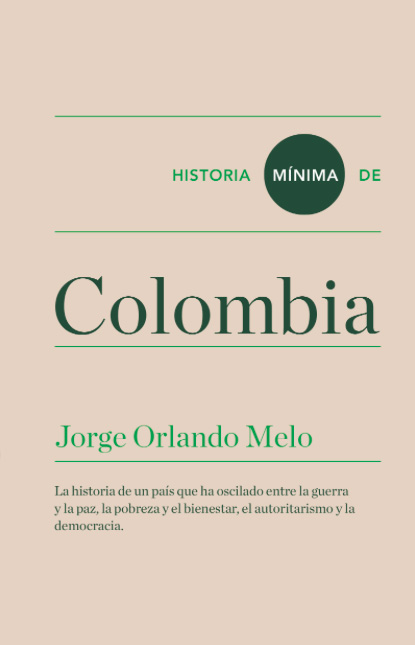 |
This history of Colombia written by Jorge Orlando Melo stands out for its evident effort of political neutrality. The processes, continuities and historical ruptures of the nation are mentioned without revealing any partisan tendency subject . The author tries to remain impartial in narrating the events that have brought Colombia to where it is today. This makes the work of Melo - born in Medellin in 1942, historian at the National University of Colombia and presidential advisor for human rights in 1990 - especially suitable for readers without a special knowledge of Colombian history, as they can judge for themselves the evolution of the creation of a nation where the State was first. This is precisely the purpose of the collection of "minimal histories" commissioned from the high school of Mexico.
A large part of the book is devoted to the colonial period, thus highlighting the importance of the historical report in the process of training of the country and in its current changes. It is not, therefore, the usual linear route through political events, but rather focuses on the cultural evolution of that report forged early and developed in successive social dynamics.
On the other hand, the role of the regions is an element core topic in the training of the colonial society, whose bequest is an inefficient central power, in a country where there are laws that seem to be negotiable, the society is divided into different social strata, the land belongs to a few and there is a constant political polarization at the hands of clientelist governments.
This happens in a Colombia in which the role of geography has been a determining factor in the processes of development of the nation. Melo speaks of isolated areas of difficult access, of very diverse subject: "islands of prosperity, security or healthiness in the middle of an ocean of poverty, violence and disease". That ocean has diminished today, but there are islands that continue to be the perfect route for drug trafficking.
The ideological struggles in Colombia have been intense: the Conservative Hegemony, of 32 years, was followed by the Liberal Hegemony, of 13; then came the era of the National Front, during which Conservatives and Liberals alternated in each period, creating an atmosphere of equilibrium and relative tranquility for a short deadline period of time. "The struggle between liberals and conservatives was, more than a political confrontation for electoral triumph, a holy war for different social models," writes Melo. However, this generated political exclusion and led to the training of groups outside the law, raised against the government and financed by drug trafficking. The confrontation made the institutional weaknesses visible and left little room for justice. Violence then became routine and ended up being Colombia's greatest historical failure, with special responsibility of those who promoted violence as an effective tool for social change.
For Melo, it is "human agency"-that is, the way in which people use their resources to adapt to circumstances-that defines history; it is men and women who, in their joint action, generate change and are the builders of their history. Unlike the most common position on Colombian history, Melo does not fall into determinism: he does not make reference letter to a culture of innate violence that naturally condemns Colombians to fight each other. On the contrary, he makes it clear that events such as April 6, Rojas Pinilla's coup d'état in 1953 or the bloody seizure of the Palace of Justice in 1985, must be seen in perspective and considered as moments of a social process.
The Colombian state did not achieve nationhood properly until the end of the 20th century, when the "dream of the creators of the nation" of having the whole territory covered by law, a single market and a political system was achieved. Colombia's unique history began with the Patria Boba, as the stage between the cry for independence and the battle of Boyacá, when the Creoles effectively achieved independence, is usually called. Since then there was a great lack of unity, manifested in an endless number of revolutions, reforms and constitutions. Colombia underwent an exhausting, exhausting and at the same time violent process aimed at achieving political, legal, economic and cultural cohesion throughout this extremely diverse country, with a geography that segmented it into regions, with varied and dispersed human groups.
But this past does not prejudge the future. The reader arrives at the end of this "Minimal History of Colombia" with the awareness of an open future for the great South American country. Colombia, once one of the most violent countries, now has a Nobel Peace Prize winner, is in a post-conflict process and has begun to be taken into account to a greater extent by the international community for its great progress.
[Robert Kaplan, The Return of framework Polo's World. War, Strategy, and American Interests in the Twenty-first Century. Random House. New York, 2017. 280 pp.]
review / Emili J. Blasco
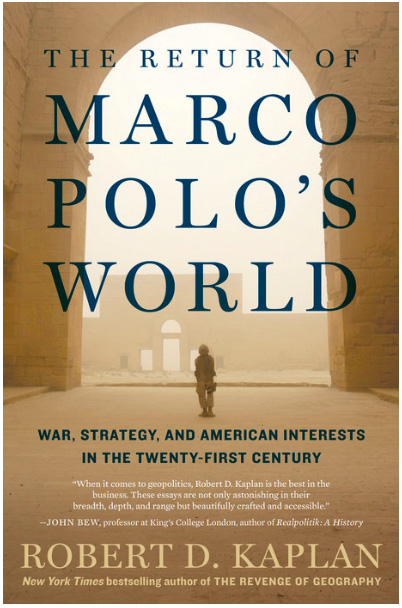 |
The signs of "imperial fatigue" that the United States is giving—a less willingness to provide world order—contrast with the destiny of projection on the globe that its nature and size imprint on it. "The United States is doomed to lead. It's the sentence of geography," writes Robert Kaplan. "No. The United States is not a normal country (...), but it has the obligations of an empire."
Between the reality of a great power whose foreign policy has entered a new phase – a certain withdrawal on the international scene, begun by Barack Obama and continued by Donald Trump – and the demands of its national interest, which in Kaplan's opinion requires an assertive presence in the world, moves the new book by this well-known American geopolitical author.
Unlike his previous works – the most recent is Earning the Rockies. How Geography Shapes America's Role in the World (2017) – this time it is a volume that collects his essays and articles published in different media over the last few years. The longest, which gives degree scroll to the compilation, was commissioned by the Pentagon; The headline of another of the texts, also from 2016, heads these lines.
Eurasia
When Kaplan talks about returning to the world of framework Polo is meaning two things. The main one is the new link that is emerging between China and Europe thanks to the increased trade, symbolized by the new Silk Road, which gives rise to a long essay about the materialization of what until now was only an idea: Eurasia. The other meaning, which he develops further elsewhere in the book, has to do with the new international order we are moving towards, which he calls "competitive anarchy": an era of greater anarchy compared to the time of the Cold War and the one we have known since then (the Cold Age). average of framework Polo was also a time of multiple powers.)
Kaplan is one of the authors who is most concerned about the emergence of Eurasia. The arrival of Syrian migrants in Europe has made it dependent on the vicissitudes in the Middle East, showing that the internal borders of the supercontinent are fading. "As Europe disappears, Eurasia becomes cohesive. The supercontinent has become a fluid and comprehensive unit of trade and conflict," he writes. And with the cohesion of Eurasia, the specific weight of the world shifts from the Asia-Pacific to the Indo-Pacific or, as Kaplan also calls it, the Great Indian Ocean.
Realism, Morals and Values
Among the many strategic aspects that Kaplan considers in relation to Eurasia, perhaps one important caveat can go unnoticed: much of China's success in its Belt and Road course depends on Pakistan acting as the leader of the Belt. core topic which, in the middle of the arch, gives it completion and at the same time sustains it. "Pakistan will be the main recorder of China's ability to link its [land] Silk Road through Eurasia with its [maritime] Silk Road through the Indian Ocean," Kaplan said. In his view, Pakistan's instability, even if it does not end up causing the country's collapse, could well limit the effectiveness of the great project Chinese.
Outside of that Eurasian chapter, the book is an argument, sober and calm, with Kaplan's always elegant prose, of the principles of realism, understood as "a sensibility rooted in a mature sense of the tragic, of all the things that can go wrong in foreign policy, so that caution and caution knowledge of history are embedded in the realistic way of thinking." For a realist, "order comes before freedom and interests before values," because "without order there is no freedom for anyone, and without interests a state has no incentive to project values."
Kaplan discusses these considerations in articles dedicated to the thought of Henry Kissinger, Samuel Huntington, and John Mearsheimer, all of them realists of different stripes, of which he is close, especially the first: Kissinger's reputation will only increase over the years, he says. On the other hand, he rejects that Trump's foreign policy can be framed in the realist doctrine, because the American president lacks a sense of history, and that is because he does not read.
Kaplan presents realism as a sensibility, rather than a guide with recipes for acting in crisis situations, and certainly on various pages he enters into the discussion on whether the external actions of a State should be guided by morality and the defence of values. "The United States, like any nation – but especially because it is a great power – simply has interests that are not always consistent with its values. This is tragic, but it is a tragedy that has to be embraced and accepted." "Because the United States is a liberal power, its interests – even when they are not directly concerned with human rights – are generally moral. But they are only secondarily moral."
[Bruce Riedel, Kings and Presidents. Saudi Arabia and the United States since FDR. Brookings Institution Press. Washington, 2018. 251 p.]
review / Emili J. Blasco
Oil in exchange for protection is the pact sealed in early 1945 between Franklin D. Roosevelt and King Abdulaziz bin Saud on board the USS Quincy, in the waters off Cairo, when the American president was returning from the Yalta lecture . Since then, the special relationship between the United States and Saudi Arabia has been one of the key elements of international politics. Today, fracking makes Arabian oil less necessary for Washington, but cultivating Saudi friendship continues to be of interest to the White House, even in an unorthodox presidency in diplomatic matters: the first country that Donald Trump visited as president was precisely Saudi Arabia.
The ups and downs in this relationship, due to the vicissitudes of the world, especially in the Middle East, have marked the tenor of the contacts between the various presidents of the United States and the corresponding monarchs of the House of Saud. This book by Bruce Riedel, a former CIA analyst and member of the U.S. National Security committee as a specialist on the region, now directs project Intelligence at the Brookings Institution think tank, is dedicated to analyzing the content of these relations, following the successive pairs of interlocutors between Washington and Riyadh.
In this relationship, the central position occupied by the Palestinian question is surprising. One might sometimes think that many Arab countries' invocation of the Israeli-Palestinian conflict is rhetorical, but Riedel notes that in the case of Saudi Arabia the issue is fundamental. It was part of the initial pact between Roosevelt and Abdulaziz bin Saud (the U.S. president pledged not to support the partition of Palestine to create the State of Israel without Arab consent, something that Truman did not respect, aware that Riyadh could not break with Washington because it needed U.S. oil companies) and since then it has appeared on every occasion.
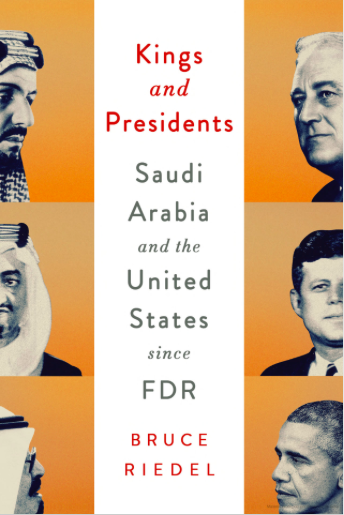 |
Progress or stalemates in the Arab-Israeli peace process, and the differing passion of Saudi kings on this issue, have directly shaped the relationship between U.S. administrations and the Saudi Monarchy. For example, Washington's support for Israel in the 1967 war resulted in the 1973 oil embargo; George Bush senior and Bill Clinton's efforts for a peace agreement helped a close relationship with King Fahd and Crown Prince Abdullah; the latter, on the other hand, led to a cooling off in the face of the disinterest shown by George Bush junior. "A vibrant and effective peace process will help cement a strong relationship between king and president; a stalled and exhausted process will damage their connection."
Will this issue continue to be a defining one for the new generations of Saudi princes? "The Palestinian cause is deeply popular in Saudi society, especially in the clerical establishment. The House of Saud has made the creation of a Palestinian state, with Jerusalem as its capital, emblematic of its policy since the 1960s. A generational change is unlikely to alter that fundamental stance."
In addition to this, there are two other aspects that have proven to be disruptive in the Washington-Riyadh entente: Wahhabism promoted by Saudi Arabia and the US demand for political reforms in the Arab world. Riedel asserts that, given the foundational alliance between the House of Saud and this strict Sunni variant of Islam, which Riyadh has promoted in the world to ingratiate itself with its clerics, as compensation each time it has had to bow to the demands of the impious United States, there is no room for a rupture between the two bodies. "Saudi Arabia cannot abandon Wahhabism and survive in its present form," he warns.
Thus, the book ends with a rather pessimistic outlook on the change -democratization, respect for human rights- that Saudi Arabia is facing from the international community (certainly without much insistence, in the case of the United States). Not only was Riyadh the "major player" in the counter-revolution at the time of the Arab Spring, but it may be a factor going against a positive evolution of the Middle East. "Superficially it appears that Saudi Arabia is a force for order in the region, someone who is trying to prevent chaos and disorder. But in the long run deadline, by trying to maintain an unsustainable order, forcibly enforced by a police state, the kingdom could, in fact, be a force for chaos."
Riedel has personally dealt with prominent members of the Saudi royal family. Despite a close relationship with some of them, especially Prince Bandar bin Sultan, who served as ambassador to the United States for more than twenty years, the book does not patronize Saudi Arabia in the disputes between Washington and Riyadh. More critical of George W. Bush than of Barack Obama, Riedel also points out the latter's inconsistencies in his Middle East policies.
[Simon Reich and Peter Dombrowski, The End of Grand Strategy. US Maritime Operations In the 21st Century. Cornell University Press. Ithaca, NY, 2017. 238 pages]
The concept of Grand Strategy is not univocal. In its most abstract sense, used in the field of geopolitics, the Grand Strategy refers to the geopolitical imperatives of a country and determines what a state must necessarily do in order to achieve its success. purpose primary and fundamental in their relationship with others, usually in terms of power. In a minor Degree In abstraction, the Grand Strategy is understood as the principle that should govern the way in which a country deals with conflicts on the international stage. This is what, in the case of the United States, is often referred to as the Doctrine of a President and aspires to create a rule for the response, especially the military one, that must be given to the challenges and threats that arise.
This second, more concrete sense is used in The End of Grand Strategy. Its authors do not question that there are geopolitical imperatives that should mark a certain action of the United States, constant over time, but that it is intended to provide a unique strategic response to the variety of security risks that the country faces. "Strategies need to be calibrated in a timely manner. agreement with operational circumstances. They exist in the plural, not in a singular grand strategy," warn Simon Reich and Peter Dombrowski, professors at Rutgers University and the Naval War College, respectively, and both experts on defense affairs.
For both authors, "the notion of a grand strategy implies the vain search of order and coherence in an increasingly complex world", "the very idea of a single grand strategy that serves everything is of little use in the twenty-first century. In fact, it's often counterproductive."
Despite the doctrines that are sometimes invoked in some presidencies, in reality different strategic approaches often coexist in the same mandate or there are even specific strategies that transcend presidencies. "The U.S. does not favor a dominant strategy, nor can it," Reich and Dombrowski warn.
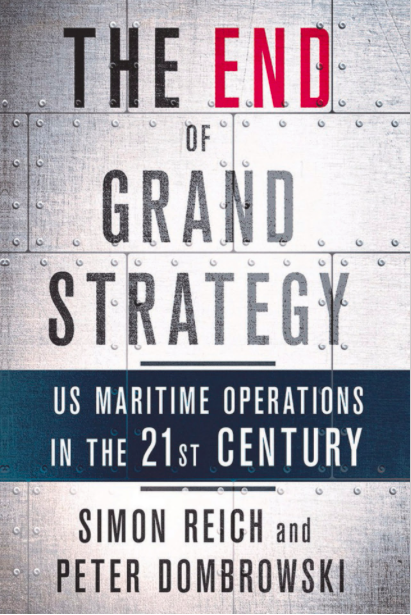 |
"The concept of grand strategy is discussion in Washington, in academia and in the media in the 'singular' rather than the 'plural'. The implication is that there is a path to securing U.S. interests in a complicated world. Debaters even tend to accept a fundamental premise: that the United States has the ability to control events, and that in this way it can afford to be inelastic in the face of a changing and increasingly challenging strategic environment," the two authors write.
The book examines U.S. military operations so far this century, focusing on naval operations. As a maritime power, it is in this domain that the actions of the United States have the greatest strategic expression. The result of that review is a list of six strategies, grouped into three types, that the U.S. has operated "in parallel" and "out of necessity."
1. Hegemony. It is based on the global dominance of the United States: a) primacist forms are commonly associated with American unilateralism, which in the twenty-first century has included the neoconservative variant of nation building (Iraq and Afghanistan); b) leadership strategy or "cooperative security" is based on the traditional coalition in which the United States assumes the role of first inter par; it seeks to ensure greater legitimacy for U.S. policies (military exercises with Asian partners).
2. sponsorshiptags. It involves the provision of material and moral resources in support of policies basically advocated and initiated by other actors: a) formal strategies, which are specifically authorized by law and international protocols (partnership against pirates and terrorists); (b) informal strategies, which respond to the request of a loose coalition of states or other entrepreneurs rather than being authorized by intergovernmental organizations (catches at sea).
3. Entrenchment: a) isolationism wants to withdraw U.S. forces from the instructions reducing U.S. commitments in international alliances and reassuring U.S. control through strict border control (a barrier against drug trafficking from South America); b) containment, which implies selective participation or balancing from outside (Arctic).
The description of all these different actions shows that, in the face of the approach As a theorist looking for a unifying principle, there are actually a variety of situations, as the military knows. "Military planners, by contrast, recognize that a variety of circumstances require a menu of strategic choices," say Reich and Dombrowski. U.S. policy, in the internship, does not replicate any single strategy. It reflects all of them, with the application of different strategic approaches, depending on the circumstances."
The authors conclude that "if observers were to accept that no grand strategy is capable of prescribing responses to all threats to U.S. security, they would necessarily recognize that the purpose The primary part of a grand strategy is only rhetoric – a statement of values and principles that lack operational utility." "By definition, the design The architectural structure of any single, abstract strategy is relatively rigid, if not static in fact – intellectually, conceptually, analytically, and organizationally. And yet that one grand strategy is expected to work in a context that demands enormous adaptability and routinely punishes rigidity. The military leadership is far more aware than academics or politicians of this inherent problem."
What are the benefits of a plurality of calibrated strategies? According to the authors, it underscores to politicians and citizens the limits of U.S. power, sample that the U.S. is also influenced by global forces that it cannot fully control and tempers expectations about what U.S. military power can achieve.
